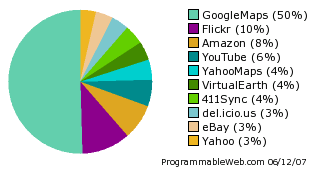eBay's new APIs: Harbingers of the Net's commerce operating system to come?

If computers as we know them today are hosts to user interfaces and APIs (they are), the Net is basically the computer's anti-Christ. Traditional user interfaces are being subsumed by the Net's UI (the browser) and the APIs are rapidly going through a phase of disaggregation to the point that what's left is no longer recognizeable as the computer we once knew and loved.

But let's take it one step further and instead of thinking of the Internet as one big operating system consisting of thousands of APIs (with new ones coming online every day), let's just take those classes of APIs and refer to them as their own operating systems. Why not? In the course of requesting permission to reprint Musser's pie chart, I discovered that not only is he seeing the same trend, he's tweaking ProgrammableWeb.com to include specific pages that map directly to certain now-coagulating verticals: mapping, mobile, telephony, shopping, government, and enterprise.
Within those verticals, the arms race is on. It' s bad enough for other API providers that Google Maps owns 50 percent of overall API usage. But in the mapping category alone, that equates to 86 percent. For all intents and purposes, Google's mapping APIs are synonomous with the Net's "mapping operating system."
Salesforce.com, it could be argued, has ascended to be the defacto provider of the Net's salesforce automation operating system (although I'm sure NetSuite would argue that it's clearly not the same landslide victory as the one Google has scored with mapping). In fact, Salesforce.com is almost a better example of the operating system metaphor because of how many commercial solutions are built on top of Salesforce.com's APIs (much the same way applications are built on top of Windows, OS X, or Linux).
Even furthering the notion of the operating system analogy is how, in many cases, the API provider's own applications are being built on top of the very same APIs they're making available to developers (the shining example there being how Eventful.com is built on top of Eventful's APIs).
It's as if to suggest that maybe, just maybe, some other developer out there might come up with a better user interface than the API provider themselves. Think of it like GNOME and KDE for Linux. Or Internet Explorer, Firefox, Safari, and Opera for the Web (although in the eyes of Web inventor Tim Berners-Lee, the browser should "get out of the way"). Let's say for example, that three or four developers come up with a better user interface to GMail than the one that Google natively provides (for some reason, I have a really hard time using GMail's native UI). If those UIs prove to be more popular with GMail's users than Google's native UI, Google could theoretically get out of the UI business for mail (provided those developers managed to preserve contextual add delivery to service Google's business model).
Earlier this year, when I had a chance to interview eBay's Mancini about that very idea -- the idea of being just an API provider (or, how about an shopping operating system provider) -- and leaving the UI development to the developers out there in developerland, he replied "wouldn't that be great?.....if our ecosystem gets to the point that we're just developing infrastructure and we can let the eBay community worry about innovations in user interfaces…"
That, if you ask me, is the Holy Grail for companies like Salesforce, eBay, Amazon, Yahoo, Google, et alia: to be in the infrastructure business but to let developers be the ones that drive adoption through innovation. Sure, if you're one of those or other API providers, it helps to provide prototypes or something that's minimally functional to get new users started. But when I look at where Google is going with Google Apps (of which Google Docs and Google Spreadsheets are only a part), my sense is that there are innovators out there that will come along and build user interfaces on top of Google's APIs that are far more compelling than Google's native interfaces.
I have complained numerous times to the folks at eBay about the eBay user interface (I even took time out of my interview with Mancini to explain where I think there's room for improvement). As an eBay user, with yesterday's announcements comes hope that I'll be able to ditch eBay's native UI for something far more engaging, compelling, and useful. But for eBay comes a different hope: the one that seals its role as the official auction operating system of the Web.